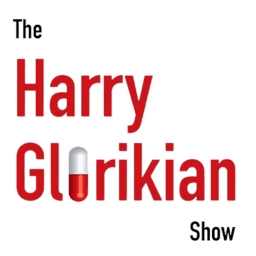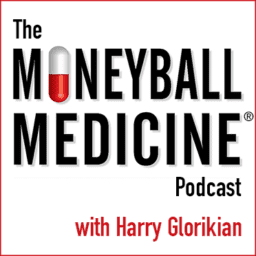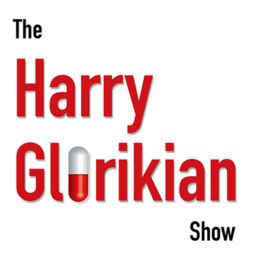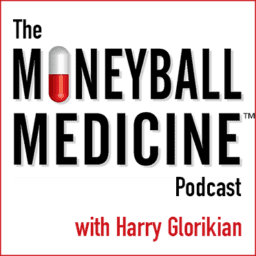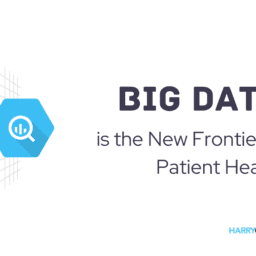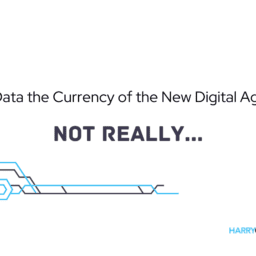Sharon Terry on Changes in Drug Discovery, Diagnostics, and the Treatment of Patients
Episode Summary:
Harry talks with Sharon Terry, president and CEO of Genetic Alliance, about the way drug discovery, diagnostics , and the treatment of patience are changing.
Please rate and review The Harry Glorikian Show on Apple Podcasts! Here’s how to do that from an iPhone, iPad, or iPod touch:
1. Open the Podcasts app on your iPhone, iPad, or Mac.
2. Navigate to The Harry Glorikian Show podcast. You can find it by searching for it or selecting it from your library. Just note that you’ll have to go to the series page which shows all the episodes, not just the page for a single episode.
3. Scroll down to find the subhead titled “Ratings & Reviews.”
4. Under one of the highlighted reviews, select “Write a Review.”
5. Next, select a star rating at the top — you have the option of choosing between one and five stars.
6. Using the text box at the top, write a title for your review. Then, in the lower text box, write your review. Your review can be up to 300 words long.
7. Once you’ve finished, select “Send” or “Save” in the top-right corner.
8. If you’ve never left a podcast review before, enter a nickname. Your nickname will be displayed next to any reviews you leave from here on out.
9. After selecting a nickname, tap OK. Your review may not be immediately visible.
That’s it! Thanks so much.
Transcripts
Harry Glorikian: Welcome to the Moneyball medicine podcast. I’m your host Harry Glorikian. This series is all about the data-driven transformation of the healthcare and life sciences landscape. Each episode, we dive deep through one-on-one interviews with leaders in the new cost-conscious value-based healthcare economy. We look at the challenges and opportunities they’re facing, and their predictions for the years to come.
Today on the show we have Sharon Terry, who’s the president and CEO of Genetic Alliance. An enterprise engaging individuals’ families and communities to transform health. Genetic Alliance works to provide programs products and tools for ordinary people, to take charge of their health and to further biomedical research. As just a mom with a master’s degree in theology, she co-founded PXE international. A research advocacy organization for the genetic condition. I’m not even gonna try to say it Sharon, in response to the diagnosis of PXE and her two children in 1994. With her husband she co–discovered the ABC’s six gene, patented it to ensure ethical stewardship in 2000 and assigned their rights to the foundation.
She subsequently developed a diagnostic test and conducts clinical trials. She is the author of a hundred and fifty peer-reviewed papers of which 30 are clinical PXE studies. Sharon has a long long list of accomplishments, which are listed on the Genetic Alliance website but some of the most recent ones to mention are, she received the health 2.0 health activist award in 2016, in 2017 she co-founded the people centered Research Foundation. And also, her most recent TED talk, which if you have not seen I would highly recommend. Sharon welcome to the show.
Sharon Terry: Thanks, so much Harry, glad to be here.
Harry Glorikian: So, Sharon we’ve known each other for quite some time, and you know, just watched the journey and oh my god where you started and where you you’ve actually ended up is really worth watching the TED talk, just an amazing story. But for those people who don’t know the Genetic Alliance, can you tell me a little bit about it and what the goals are of the organization?
Sharon Terry: Sure, thanks for asking. So, we are a 32-year-old organization, genetic alliance and our mission really is in a nutshell to get the people’s voice, data, interests all at the center and in our early years that simply meant helping advocacy organizations. You know disease support groups to do their job better, and in more recent years I’d say the last 15 or so even is to look at systematically how we are going to change health and medicine such that it does serve the needs of people. And that those of us who can be a veritable army can contribute to helping to accelerate. Whether it’s drug development, device development. You know getting the right drug to the right person at the right time, essentially the essence of precision medicine how do we accelerate all that in both very human high-touch ways as well as technology and data kind of ways.
Harry Glorikian: We’re always talking about you know data, but your organization seems to run across many different areas. Some of it being drug discovery, some of it being diagnostic and then ultimately you know the two coming together for the treatment of patients. So, how do you see the data changing drug discovery, you know and diagnostics and finally you know how does it get to the patient and the treatment?
Sharon Terry: Yeah, that’s a great question so I think my hope because I think I’m going to be somewhat aspirational in what I say now and I’m not sure we’re there entirely and happy to talk about maybe why not, but my hope essentially is that if we can get people and their data in the game. And I want to say not just the data because I think there’s a lot of attraction or sexiness around oh if we just get big data, we have everything we need and we will get faster drugs and the right drugs and the right people or the right devices. And I think we need to engage people more fully than we have in the past and by that, I mean, have people as part of what kinds of questions we want to answer. How do we want to answer them and what ways we’ll go about answering them?
And my dream, my aspiration is the same as a lot of people in this space and that is if these data from people in real time could be aggregated in such a way that the data themselves start to give us hypotheses. That the hypotheses can be answered quicker, faster, cheaper. Then we are going to see a transformative process and I think we know this in so many industries already you know we know it in in how we hail a ride now.
We know it and we’re so used to it in how we decide we’re going to get music or get a video or get access to even a – even a television program or even these podcasts. You know we want everything on demand, we want an easily searchable and we want to know what we want to know when we want to know it. And I think medicine, if it could get out of its own way in terms of being both a cottage industry and a highly regulated one, could really benefit if we let these data actually do the work with the people who will bring these data forward.
Harry Glorikian: Now we’ve seen some advances though in certain areas I mean if you think about you know Francis Collins and the cystic fibrosis gene and now the drugs that are you know a result of the work that he’s done. Are there examples that you can offer up for in different areas that people may not be familiar with?
Sharon Terry: Yeah, and one of my hesitations and offering any example is I’m not sure they’re the kind of big data we want to see eventually but I think there’s some examples of where it’s made a difference to have people and their data come together with the right scientists.
And so, an example I’ll give in fact is in PXE and I’ll say it pseudo xanthoma elastica means never having to say – PXE means never having to say pseudo xanthoma elastica, so you don’t have to either. So, in the disease my children have nobody knew much about anything in it, of it because it’s one in a hundred thousand or one hundred fifty thousand people know it no one even knows how many. And as we began to work in this disease all the way back in 1994 and we decided data was needed. We needed to aggregate the data and have the data speak.
We started to see some patterns and so for example one was in in questionnaires and surveys that we deployed to the population of about – I don’t know four thousand people that we found, women always reported that they were having biopsies when they had a mammogram. And those women went through the biopsy, which was certainly painful. They went through the waiting to see if they had cancer because that’s why they were receiving the biopsies because of suspicious calcification, and when we started to see well every woman was responding the same way to these surveys.
And then we got enough of their mammograms and got age match controls, we saw that every single one of them had micro calcifications of the breast and that it was just part of the disease and while that’s not a cheery bit of news, it is not a problem. It’s a subclinical problem and it didn’t mean they were going to have cancer. So, now every woman can go to their radiologist with our bulletin, that says this is just part of the disease. I don’t need a biopsy and it is not cancer so a small example in a small disease I think of when we start to let these data actually tell us something that we probably weren’t looking for.
In this case in eye disease we start understanding things better and I think we have examples of that and quite a number of diseases, common ones, where you know, for example celiac disease was once thought to be a rare pediatric problem. And we now all know and probably find it astounding that that’s what it was thought of as. We now know from the work of the celiac disease foundation, finding people looking through electronic health records, allow you to know allowing clinicians and patients to tell their stories, that in fact it’s a very common condition and it spans all ages.
So, I think if we can start to harness data this way on in a more systematic way than just through the heroic efforts of one individual or one organization, we’re going to start to see some answers fall out pretty quickly from the combination of clinical data, genomic data and test results.
Harry Glorikian: So, I’ve been in the field for you know I’m not gonna say 32 years but definitely you know 25, 26 years and I just see this field from a data perspective moving much faster you know when I think about the – you know genomic projects and everything where every time Intel would release a new chip you know there was more and more that we could do with the data analysis and crunching of information would move a lot faster. And that seems to be moving, you know much faster.
So, do you see the field moving faster or maybe in a more targeted way because of how the data and the latest analytical tools, whether their AI or machine learning are being applied?
Sharon Terry: Yeah, I do. I see some pretty good projects you know we can start with all of us the nation’s precision medicine project that Obama announced and is now enrolling people starting to consider how it will how that data will inform discovery and that’s still in a pretty nascent stage, more mature projects are probably ones like the patient-centered outcomes Research Institute has funded a network called Cornett and it just finished a study and the data is being analyzed right now, looking across tens of thousands of records of individuals taking either low or high dose aspirin after a cardiac event.
Something that you know we all know is standard, but we don’t know why and or how much aspirin to give and I see that project giving us information about how to prescribe in the future. So, more quickly targeting those who need the therapy and being able to figure out how much to give – the accelerated medicines project which is a combination of the foundation for NIH and NIH working together looking at data for diseases like Alzheimer’s. Where, my goodness you know, this is a national scourge in some way and we baby boomers as we age are going to be overwhelming the cost of delivering healthcare, with the amount of dementia and the lack of understanding we have.
And starting to see there some associations in genes some patterns and what kind of treatment might work and might not be effective, I think are more quickly honing in on how to get to therapies that make sense and not just a more scattered effect like we’ve done in the past.
Harry Glorikian: Yeah, I mean if you’ve I don’t know if you saw Joel Dudley’s paper from Mount Sinai, highlighting that we should be looking at I believe it was herpes simplex six. As a you know driver to Alzheimer’s and you know his philosophy is throw all the data into the system and have the system point you or at least start to elucidate some hypothesis, that you may want to then go chase down and I was talking to him.
And he was he told me that NIH was sort of very shocked when he went to first present the data and as I’m sure as you can imagine, when you’ve been trying to run down a hypothesis for 20 years and somebody new walks in and says you know I threw this in the system and the data sort of pointed me in a different direction, it’s a sort of shocking dynamic.
Sharon Terry: Yeah, absolutely and I love the work that Joel and others are doing, and I can think of a couple characters on the east and west coasts that have decided let’s just throw these data together, exactly that and see the kind of things that we’re just gonna at first say no way! That can’t be and then look at them for real say ah this is not just an association that academic this in fact is going to have an effect on how we think about this disease and what we might do for prevention, because ultimately, we’d all love to prevent these diseases rather than live them out and be treating them in some way, that only mitigates a few of their symptoms.
Harry Glorikian: Yeah so, do you see any platforms out there? I’m also you know thinking you know if we go down some of these routes. I think some of the business models may be affected but do you see anything that you know like some groups that might stand out more than others or technologies?
Sharon Terry: Yeah so, everything from the kind of very high technology ones that are still I think trying to fine tune their efforts so like Joel’s I think is a pretty phenomenal system at least when he lets me look under the hood a little. Ad I see the kinds of even graphic maps that are coming out of what he’s doing heat maps and network diagrams that are really popping these associations, I also think that ones that are a bit more staid but have the potential to have a lot of power.
So, for example peak or net has a common data model and that models on its fourth or so version and each version allow in that case clinical records from across the United States from many centers to come together and start to articulate through its own sort of process. What is important to people? What patterns are we seeing? And then we even have one little old Genetic Alliance, that we’ve worked on for quite a number of years called the platform for engaging everyone responsibly. And in our case, it started out as a fairly simple registry system so that the disease advocacy groups would have a place to put both clinical data and patient reported outcome data and we’ve been able to build into it a something called privacy layer, from a little company called private access.
That in fact allows each individual to make a decision about where their data will go and how that will be used which sort of breaks down those silos, that we have that are pretty troublesome to me in that – if I am in one academic medical center and in their study, they’re not likely to share with competing academic medical center. Whether it’s geographically near or far and I want to make a decision about having my data shared more widely.
Same thing, if I’m in a in a company’s registry I’d rather have my data shared more widely so even something like our platform peer, I think is allowing a kind of new paradigm to happen and you know I’m very interested in in what you said at the beginning of this particular query and that is some of these business models, that we currently have are going to have to shift. And I think we you know if we were completely honest, we probably would say we don’t have a business model for most medicine now, that we’re trying to live on the old blockbuster model for drug development. And that device has probably never really got a good value equation set up, so that it had they have a robust system.
And certainly, the realm of how we engage people because again ultimately, I think we could have all the technologies and all the data in the world and if we don’t convince people at first with probably a lot of effort, that they need to be involved. And then I hope we get to a place where it’s frictionless where you know just like any other system that’s using my data to figure out what ads to send me or what car I might want to buy, is also able to start to figure out what do I need in terms of my health I’ll be at doing it with a lot more responsibility and a lot more sensitivity to my privacy, my security, my desires and preferences around sharing. I think those are going to shift this like other industries have shifted and we’re going to need more business models.
Harry Glorikian: Well, you know you mentioned that, and I keep thinking you know the status quo, hasn’t really shifted much relatively speaking but if you look at you know Apple and being able to share your EMR, their research kit and being able to you know recruit patients at you know numbers that we used to – we couldn’t even have dreamed of, you know not that long ago. People like Amazon and others coming into the space that have sort of a direct link to individuals. I mean everybody is a patient at some level, whether they’re a patient at that moment or they’re going to be a patient one day, but I always – what do you think about these groups coming in and providing tools and accelerating some of this change and being able to share information.
Sharon Terry: I am really excited by them and I think I’m in some cases at least in the traditional biomedical research space or in what is considered the academic bastions. I’m an outlier in that, I’m not worried about the way many others are you know if a commercial entity like Amazon gets into this game, Berkshire Hathaway you know we can name the characters that have decided to come together, isn’t that going to be bad for medicine and health. Because it should remain outside of what we consider retail or business.
And I don’t think so, I think that until we actually do hold ourselves accountable in the same way businesses do for example we won’t be able to make the forays we need to make. And for goodness’ sake we keep using the same model in whatever you know clinical trial were enrolling next we’re putting up flyers and their bus stops, when you know everybody knows we you know you have an Amazon account, and something arrived sometimes the same day at your doorstep. The same kind of power presented to medicine and health and health delivery of services will make a really big difference.
I think there’s going to be a lot of chasing at that, because there you know we have a system particularly in the United States, where we’re pretty proud of keeping this in a supposed sacrosanct manner away from business and industry and doing this in academic institutions that are funded largely by the government. And you know I think all that discovery is fabulous and when we need to get to delivery and delivery in a way, that is easy and affordable and comfortable for those of us who seek who seek resolution to the problem. I mean we get to something as silly as the fact that most of us can’t go to the doctor at night or on the weekend, in 2018.
You know that’s kind of remarkable that that whole community has been able to hold us hostage in a way that is helpful for us.
Harry Glorikian: Yes. Well, it’s interesting because I’m seeing so many companies and approaches that I think are really gonna shift some of this dramatically. And I’m not sure that everybody’s ready for the pace of change that technology enables. So, that’s going to be an interesting change in the landscape, but so you know always bringing this down to how people are affected is you know. Can you give us an example you know again you know want to protect people’s privacy and everything, but an example of a patient or a family that you can walk us through, so how the data really affected? Either the diagnosis and or the treatment and you know we’re always trying to hone in on how does it improves outcomes and lowers cost.
Sharon Terry: Right, yeah so, I mean, I think there’s some tremendous examples that right now or you know someone could argue our one offs, and you mentioned diagnosis. So, you know there’s the pretty famous and your quotes, story of Matt might who was an informatics computer professor and Utah and had a child with a disease and nobody could diagnose and using a blog. And what he knew, and he wasn’t in health at all, using what he knew about how to essentially have his blog go viral, was able to match information about phenotypes that he had collected and way that was more structured and more organized. Perhaps than just saying there’s something odd going on here and finding another child in the world.
And I think, it was in Italy with the condition that his child had both unnamed conditions, but the difference was the kid in Italy was receiving a treatment that then he could try with his child and the story is a happy ending, one in the sense that it helps his child not go on to develop either a very debilitating set of symptoms and/or die. There’s a whole host of these stories now, because as we especially get genomic information and clinical information together and, in his case, they saw that the mutation was the same as an unnamed disease, that really is quite helpful.
I think we’re also seeing some benefit when we bring together large amounts of data around treatment and do some comparative effectiveness around what in fact is effective, and isn’t. And some families report for example being given an arthritis drug and not having to go through what the neighbor did of you know five drugs, before they found an effective one. But because of using large-scale genomic data together with clinical data, are much quicker to prescribe the right drug and the person then doesn’t suffer, not only the disease but the uncertainty down the path down the line of having the wrong prescription over and over.
So, I think we are seeing all of this move much more quickly, what I think we need to do however is again to figure out how do we get more people engaged, such that they are really willing and able to give these data, their own clinical data to systems that will accelerate this process. And even, I mean I have another sort of complaint in this picture and that is what we find is that there is in especially academic medical centers often some stonewalling about sharing that data. I think because they’re trying to cover their own butts and keep their data, so that it’s their capital and instead they often hide behind institutional review boards for example and say this would violate people’s privacy to share these data.
I think when you ask people, people expect that in fact these are already shared, and that while certainly none of us want to expose ourselves to discrimination or stigmatizing kinds of activities. Most of us want solutions quicker than they are coming, and would be shocked to find out that these data aren’t already being shared.
Harry Glorikian: Well interesting right, if you look at the latest embodiment of the iOS platform on Apple, I believe they’ve incorporated the sharing capability of your electronic medical record. So, if you had an app on there that was relevant to the patient, the patient in there you know in their right here in the US, could push a button and technically share information with the app. Now whether it was that particular detailed information that you need, I don’t think that downloads to your iPhone just yet. I don’t think those portions of the EMR transfer yet, but that’s just a matter of time, not that it’s never going to happen.
And then you know in one of our previous episodes of the podcast, I had the chance to interview the CEO of FDNA, which I think is trying to accomplish a lot of the things that you’ve been talking about, where it comes to diagnosing disease based on an image of a child. and then there now also you know have been pulling in genomic information to not only do phenotype a genotype.
Sharon Terry: Right, yep yeah and I think we’re seeing a whole host of these companies and social benefit Corpse and nonprofits all coming together in different ways. So, you know I can think about there is a project that’s looking at how do we get electronic health records, medical records from anywhere anytime moved into these research systems. Little company called med fusion that’s able now, I forgot their numbers something like 30,000 different systems in the United States. They can pull from and pull that detailed information into a portal, where then the person can make a decision about where it should go.
Hugo at Yale, Harlan krumholz their visionary for a long time about how people should control their own information has built essentially an app, that says bring my information my electronic health record into Hugo. And I’m gonna make decisions about where it goes, you know again our platform does that with a kind of higher degree of granularity about pointing, where I wanted to go and when I want it to go. These things, I think make an enormous difference a company called the Luna DNA, which I’m an advisor for in the San Diego area, is bringing together genomes in such a way that people get to make decisions about how they’re shared and when they’re shared and where they’re shared.
And in that case even start to talk about a business model, one that probably bothers a lot of people, but I think it is the right one. And that is if there’s going to be money made on exchanging these data on essentially giving access to data, large pharmaceutical company steps up and buys access to a bunch of genomes. The last person to get any benefit will be the individual who donated that genome. And so, Luna DNA is looking at and how do you give people essentially shares in the company, such that they’re benefiting not only by maybe a discovery forty years from now, but by the money that’s already being exchanged and the currency of data, right now.
So, I think we are seeing a whole host of companies and nonprofits working in this fear where we’re going to see a lot more activity. And as you said just a little while ago that rate of change and kind of change in culture will definitely be very bothersome to some people and agitating in fact.
Harry Glorikian: How do you see you know patients engaging in this or what would you recommend to people listening to this? Some of them are going to be industry players, but you know hopefully a lot of them are you know just people, average people that would you know want to be looking to us to help them or help the field move forward.
Sharon Terry: Yeah, so I think, I tried quite a number of years ago with folks from the Obama White House to actually get a kind of campaign that is called free data. And it’s as simple as saying to one’s own doctors. You know first of all I want access to my data and then I want you to be pushing this data out to research systems. The answer is going to be, sorry I don’t know what you mean, and I can’t do that. But I think if all of us started to say, first of all we already have the legal right to these data, secondly, we want these data to start to move that there’ll be some kind of social consciousness shift here.
I think the other piece for the average person is when the opportunity arises and right now it takes too much effort in my opinion. But when the opportunity arises to say, you know I’m going to use my Apple watch or I’m going to use my iPhone or my other kind of smart phone to actually engage in some kind of health data sharing. I think that kind of pressure starts to move the needle. One of the things I’m always exploring is how do we actually get people closer to the process. And you know and you know this well, and lots of other industries if I wanted a song.
Then you know somebody created Napster and I stole music essentially and there was so much demand that then iTunes comes along, and other more legal and easier-to-use solutions or you know if I wanted credit cards to talk to each other. I don’t know if you’re as old as I am Harry, but there was a time when you know MasterCard did not talk to Visa. You had to use them in separate places and consumers where you know what kind of nonsense it is that, I want to use any card anywhere. In health I don’t find that we the people have an easy way to go to our health provider or to the research system and say, I want a solution faster, I don’t want to wait five autism drugs before you treat my kid. I don’t want my kid to be suffering from asthma or diabetes as long as they are because you can’t figure it out.
So, you know I’m really interested in how we get consumer pressure on this system, that’s largely a black box and it seems if you push on one part another part pops out. But you don’t know how to put really good consumer pressure on it.
Harry Glorikian: Sharon, I’m not encouraging any company or anything but I can already see the commercial with you on it. Remember the crazy one’s commercial from Apple of wanting to change. So, imagine they’re moving in this direction right, making this platform you’re the ability to carry your EMR with you and share it with whomever you choose. So, you’re not violating HIPAA or anything else and they want their platform to become the most valuable. And if it’s got your medical record on it becomes darn well important to you.
So, I can just see Sharon Terry the genetic Alliance or you know Sharon Terry the mother, you know being on an Apple commercial.
Sharon Terry : Or the crazy woman, yes.
Harry Glorikian: Well, you know we’re all a little bit on the edge, if we’re trying to constantly change things. But this has been fantastic, thank you so much for taking the time. Yeah, and I look forward to doing this again in the future as things keep changing and improving.
Sharon Terry: Great thanks Harry and thanks for bringing these cutting-edge issues to everybody in your podcast, very enjoyable and worthwhile.
Harry Glorikian: Thank you.
Sharon Terry: Take care.
Harry Glorikian: Bye-bye.
Sharon Terry: Bye-bye.
Harry Glorikian: And that’s it for this episode, please join me for the next episode where I speak to dr. Robert Greene. He is a professor of medicine genetics at Harvard Medical School and a physician scientist who directs the genomes to people research program at Brigham and Women’s Hospital and the Broad Institute. We’ll be digging into the individual’s genome how that data is being used and its impact on the different stakeholders.
If you enjoyed Moneyball medicine, please head over to iTunes to subscribe, rate and leave a review. It is greatly appreciated, hope you join us next time, until then farewell.
